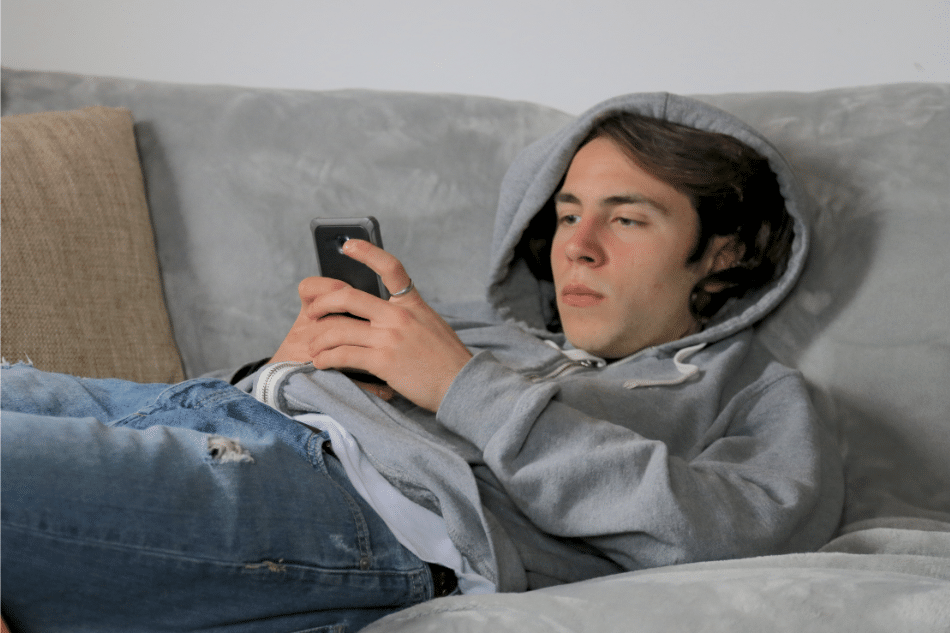Cancel Culture Anxiety in Teens: Fear of Social Rejection and How to Cope

When we hear the term “cancel culture,” it’s easy to picture celebrities being called out for a controversial old post or exposed for doing something harmful. While the idea began with good intentions – holding people accountable – it has evolved into something that can spiral quickly.
Once cancel culture gains momentum, it can create real damage, not only for the person on the receiving end but also for those caught in the ripple effect.
If you or your teen is affected by the fear of cancel culture, this article can help you understand:
- What cancel culture is
- If cancel culture is only found online
- Why teens engage in cancel culture behaviors
- The signs of cancel culture
- How cancel culture can affect teen mental health
- Where to get mental health support for cancel culture

What Is Cancel Culture?
For those on the receiving end of cancel culture, the impact can be difficult to cope with. Public backlash can quickly grow, and a reputation once seen as steadfast can take a lasting hit. This effect is part of why the topic gains so much attention whenever a high-profile case surfaces.
Yet, cancel culture itself didn’t begin online. Public callouts and organized refusals have existed long before the rise of social media. What platforms like X or Instagram have done is make this accountability louder, faster, and far more visible.
While the term cancel culture is relatively new, today’s callout style has clear roots in protest and activism, and the basic patterns have been around for much longer than the internet.1
Can Cancel Culture Happen Offline?
Many people assume cancel culture only happens online, but it can spill into everyday life as well. In schools or friend groups, it might not be labelled as “cancel culture” specifically, yet it can share the same core behaviors.
The following sections cover how cancel culture can start in real life:
Out-of-Context Remarks
Sometimes people only hear part of a story and make assumptions. You might say something as a joke, but if someone overhears without knowing the full situation, they could take it the wrong way. By the time it’s been retold a few times, the meaning may have completely changed.
Doing Something Bold Can Spread Quickly
In schools and smaller groups, news travels fast. A comment, a screenshot, or a rumor can be shared around group chats before you’ve had the chance to explain. So what starts with one person can quickly spread to others.
Others Not Finding Out the Real Facts
Sometimes people form opinions based on what they’ve heard rather than what they’ve seen for themselves. If a story gets passed around enough, it can start to feel true, even if it isn’t.
So with all things considered, why does this type of behavior happen?
Why Do Teens Engage in Cancel Culture?
Social rewards and social punishments: During adolescence, your brain is extra sensitive to what your peers think. At your age, belonging feels amazing, but rejection stings – really stings. This sensitivity can push people to join pile-ons to feel safe with the group or to avoid becoming the next target. This is what’s known as the “Social Reward/Social Punishment Framework.”2- Group momentum: Strong emotions move fast online and within a school setting. Once a dogpile starts, the tone can turn harsher than anyone planned. Thus, it can feel easier to amplify the situation than to slow things down.
- Fear of spotlight: Perhaps some people aren’t quite sold on the canceling of others, but asking for context or nuance can get read as “defending” the person. In this situation, you may feel that staying silent or nodding along can feel safer than risking attention. It’s situations like this where the cancel culture mob grows stronger.
- Copying your favorite creators: Creators often model quick judgments and “gotcha” content because it gets views. If this is the type of content that interests you, there’s no initial harm in it. But if it’s the type of content you absorb frequently, the door might open for you to mimic the creators you respect the most.
Understanding these forces doesn’t excuse harm, of course, but it can explain why things can escalate and why it can feel hard to swim against the current.
Recognizing the Signs of Cancel Culture
It’s worth noting that not every negative reaction is a cancellation. People are allowed to voice their opinions when something hurtful is said. They’re also allowed to set boundaries or disagree, as these are perfectly natural responses.
Cancellation, on the other hand, has a different pattern, and you might see signs like:
- Dogpiling: Many people shaming the same person, often beyond the original issue
- Receipts harvesting: Old posts or private screenshots pulled out to build a “case”
- Side-taking pressure: Friends may be told to stop hanging out with someone to “prove” values
- A lack of an off-ramp: Any apology or context given being mocked or ignored
- Social exile: Being pushed out of chats online, teams, events, or leadership, even after attempts to repair the situation have been made
Recognizing when cancel culture is happening is only the first step. The next is understanding how it can shape emotions, behavior, and even the way you see yourself.
How Cancel Culture Can Affect Teen Mental Health
Before we start this section, let’s consider two scenarios:
Scenario 1
You share a post you thought was fine, but someone points out a problem. You take it down and apologize. By evening, your apology is screenshotted, your old words are resurfacing, and people you care about have gone quiet. Your chest feels tight, and the butterflies in your stomach won’t rest. You’re now scared to open your phone and worried about the backlash at school tomorrow.
Scenario 2
In class, you have a point that could add to the discussion, but you keep it to yourself. The topic feels controversial, and speaking up might make it seem like you’re taking a side. Over time, you consistently stay quiet until silence starts feeling safer than saying what you really think.
Unfortunately, these two scenarios aren’t rare. Cancel culture can affect the mental health of those involved and those around it. Below, we take a look at three of the most common knock-on effects of cancel culture
Anxiety
Cancel culture can cause intense anxiety, whether it starts online or carries into everyday life. Public shaming can make it feel like judgment is constant, while cyberbullying may add another layer of fear and unpredictability.3 The stress of seeing your name or actions picked apart can leave you feeling trapped in a cycle of worry. When this happens, even ordinary parts of life, like school or friendships, may begin to feel overwhelming and unsafe.
Self-Isolation
Cancel culture can lead to deep social isolation, which is a common reaction to being cancelled or a fear of it happening. Being shut out triggers the same parts of the brain as physical pain, making the experience feel intense and overwhelming.4 This isolation can worsen mental health and, for some, lead to serious issues like anxiety, PTSD, or even suicidal thoughts.
Self-Censorship
Self-censorship happens when people hold back their opinions or change how they act to avoid backlash. In the shadow of cancel culture, even small comments can feel risky, so some teens start watching every word and move, both online and in person. Over time, this can damage confidence and make it harder to express who you really are. This can also bring stress and anxiety, especially when you feel trapped between staying safe and being yourself.5
I Feel Like I’ve Been Canceled – What Can I Do?
If you feel this way, first, try to name what’s happening. A falling out is usually a conflict with one person or a small group, but cancellation is a wider, more coordinated shaming that can have social consequences beyond your immediate circle. If it’s a falling out, private repair might be possible over time, especially with guidance from someone you trust.
If you believe you’re experiencing cancellation, reach out to someone older or more experienced who can help you deal with the situation. They might suggest taking a break from social media or, if it’s happening at school, involving teachers or a school counsellor to create a plan.
No matter how capable you feel, it’s important not to go through this alone, as having support can make a huge difference.
Do I Need Mental Health Support For Being Canceled?
There isn’t a definitive answer here, as no person is the same. For some, being canceled, or even living with the fear of it, might not have a lasting effect. For others, it can feel overwhelming and start to impact day-to-day life in ways they’ve never experienced before.
If cancel culture has left you feeling worn down or struggling with new challenges, know that there is support available to help teens navigate these situations.
Below, we’ll explore some of the tools and options that can make a difference.
DBT for Social Anxiety in Teens
Dialectical behavior therapy gives you skills for handling big emotions, setting boundaries, and staying steady when comments heat up. It’s useful when you feel overwhelmed by peer reactions and need tools you can use in real time.
CBT for Reputation Worry
Cognitive behavioral therapy helps you catch the thought patterns that push you into panic: mind-reading, all-or-nothing thinking, and worst-case predicting. In sessions, you’ll practice testing those thoughts and taking small steps that build real confidence.
Therapy for Fear of Judgment
Therapy can help you process the sting of public shame and rebuild a sense of self that isn’t controlled by others. This matters because teen brains are especially sensitive to acceptance and rejection signals, and guided support can act as a strong buffer.
If some of these therapies or tools sound like they could help you right now, you might be wondering where to find them. The next section will guide you through exactly that.

Mission Prep: Support for Teens Facing Cancel Culture Anxiety
At Mission Prep, we understand how social media pressure and peer dynamics can quickly turn into real-life stress. We help teens build emotional resilience for social pressure, steady their emotions, and regain confidence in how they present themselves.
Our therapists use CBT for obsessive worry about reputation to break anxious thought loops, and DBT for social anxiety in teens to create more balanced responses in stressful moments. For those dealing with bullying and cancel culture, we focus on repairing trust and rebuilding a sense of safety in social spaces.
Some teens benefit from inpatient care for cancel culture trauma, while others make progress in outpatient or short-term programmes. Whatever the setting, we shape it around each individual’s needs.
If you’re ready to move from constant caution to genuine confidence, reach out today. We’re here to help.
References
- Traversa, M., Tian, Y., & Wright, S. C. (2023). Cancel culture can be collectively validating for groups experiencing harm. Frontiers in Psychology, 14(1181872). https://doi.org/10.3389/fpsyg.2023.1181872
- Telzer, E. H., Jorgensen, N. A., Prinstein, M. J., & Lindquist, K. A. (2020). Neurobiological Sensitivity to Social Rewards and Punishments Moderates Link Between Peer Norms and Adolescent Risk Taking. Child Development. https://doi.org/10.1111/cdev.13466
- Wendy Wen Li, Heward, C., Merrick, A., Astridge, B., & Leow, T. (2024). Prevalence of experiencing public humiliation and its effects on victims’ mental health: A systematic review and meta-analysis. Journal of Pacific Rim Psychology, 18. https://doi.org/10.1177/18344909241252325
- Kross, E., Berman, M. G., Mischel, W., Smith, E. E., & Wager, T. D. (2011). Social Rejection Shares Somatosensory Representations with Physical Pain. Proceedings of the National Academy of Sciences, 108(15), 6270–6275. https://doi.org/10.1073/pnas.1102693108
- Alam, N. (2025, February 25). Benevolent self-censorship in safe spaces. Psychology Today. https://www.psychologytoday.com/gb/blog/pop-culture-mental-health/202502/benevolent-self-censorship-in-safe-spaces



















